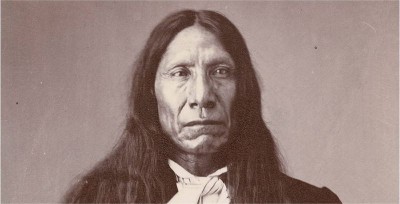
Editor’s Note: To many Native Americans, Thanksgiving is a “Day of Mourning” that marks the genocide of thousands of Native Americans, the theft of Native lands and the assult on Native cultures. A few hundred Native Americans plan to gather along Plymouth shore to tell the stories of their ancestors. Viji Sundaram is the health editor for New America Media.
Today, while the aroma of stuffed turkey, apple pie, mashed potatoes and cranberry sauce fills kitchens across the United States, a few hundred people will gather along the shores of Plymouth and observe what they call their “National Day of Mourning.”
Massachusetts Gov. John Winthrop might have declared 1637 the first official day of Thanksgiving, but for many of the nearly 3 million Native Americans, it’s a cruel reminder of the massacre that year of 700 Pequot men, women and children by the Puritans, who had arrived a few years earlier on the Mayflower and were warmly greeted by Native Americans with food. Later, the visitors were given land, taught to plow, sow and tend to their crops.
In declaring the day as Thanksgiving, Winthrop announced the day marks the sharing of the Pilgrims’ first harvest with the Native Americans.
Not true, say the indigent people. It is the reminder of the genocide of thousands of Native Americans, the theft of Native lands and the relentless assault on Native culture, said Wampanoag Indian Moonanum James, co-leader of the United American Indians of New England.
“We are trying to correct a lot of history that says the Indians and Puritans sat together (in 1621) and rejoiced and feasted,” James said.
He said that in 1970, his father, Frank James, was asked by Gov. Frank Sergent to write a speech commemorating the 350th anniversary of the landing of the Pilgrims in Massachusetts. What the older James wrote, instead, was a censorship of the Pilgrims, accusing them of robbing American Indian graves, stealing from essential food caches and decimating the native population.
When the senior James refused a request by the governor’s office to rewrite his speech, he was dropped from the program, prompting Native Americans to declare Thanksgiving a National Day of Mourning.
Since then, Moonanum James and hundreds of other Native Americans from across the country have been converging on Plymouth Harbor to let people know that Native Americans have nothing to be thankful for.
Chanting and beating drums, they will first hold a “speak out” on Coles Hill overlooking Plymouth Rock and tell of the atrocities they have been facing since the Pilgrims arrived.
They will also demand the release of Leonard Peltier, a former American Indian Movement activist convicted in 1977 for the 1975 deaths of two FBI agents at a shootout on a South Dakota reservation.
James said the National Day of Mourning will only cease “when history books accurately reflect” what the Puritans did to Native Americans, when fishing and hunting rights are restored to his people, when the 360 or so treaties made with them are fully observed and when “our people are allowed to rule ourselves.”


